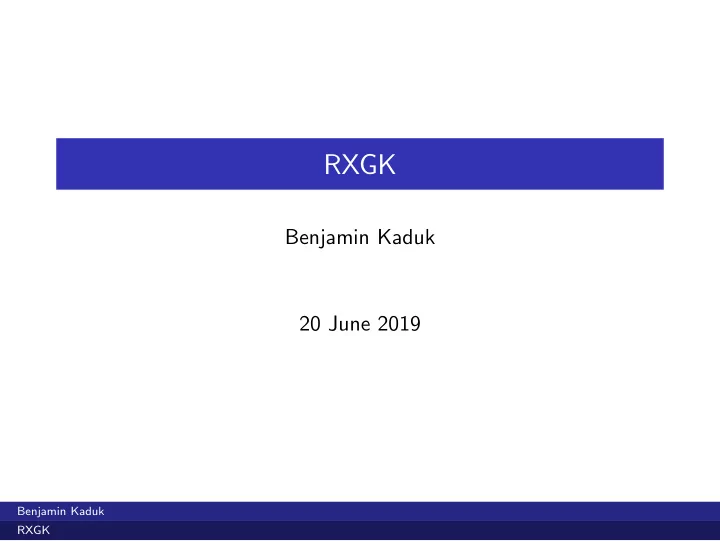

RXGK Benjamin Kaduk 20 June 2019 Benjamin Kaduk RXGK
rxkad is bad roots in Kerberos 4, modified piecemeal as the ecosystem moved around us 56-bit keys, susceptible to brute force for O($100). confidentiailty protection for data transfer is painfully slow integrity-only is basically the same CPU cost as confidentiality server can’t tell client to use encryption (or not) Benjamin Kaduk RXGK
Rx security refresher Client Server Pick security (mode) to use First packet of call --------------> <----------------------------- Challenge Response --------------------------> <----------------------------- Ack [Rest of RPC request] -------------> <----------------------------- [RPC response] Benjamin Kaduk RXGK
rxgk is good Uses the same crypto primitives as Kerberos 5 (extensible!) Including 128- and 256-bit (AES) keys AES is faster than DES (and hardware acceleration is common) integrity-only HMAC is lower overhead than AES+HMAC separate negotiation (RPC) for crypto parameters Benjamin Kaduk RXGK
What is rxgk? Over the (many) years, “rxgk” has come to encompass several things: encryption/MIC of data on the wire with krb5-level of protection robust key hierarchy GSS-API for initial authentication explicit negotiation of security parameters/capabilities combined host/user credentials prevents cache poisoning allows for richer ACLs per-fileserver keys . . . Benjamin Kaduk RXGK
What is rxgk? . . . full support for multi-instance Kerberos principals non-Kerberos GSS mechanisms secure callbacks flexible/extensible token format opportunistic security for anonymous clients Benjamin Kaduk RXGK
Specific mechanisms Concretely, this means rxgk provides: packet-level protection routines new RPCs for negotiation/obtaining tokens new RPC for registering per-fileserver keys (which needs a new authorization model as well) a solution on top of existing key agreement techniques like anonymous PKINIT Benjamin Kaduk RXGK
rxgk-phase1 The “rxgk-phase1” topic provides: the core packet-protection routines printed tokens from the cell-wide key strong protection for localauth and (most) server-to-server comms Benjamin Kaduk RXGK
What’s in 1.9.0? The 1.9.x release series would be “development releases”, a (relatively) rapid release cycle that is essentially snapshots of master . So, no prereleases; some releases may be very buggy/unstable; bugfixes are just in the next snapshot. rxgk-phase1 options for vlserver/ptserver to use rxgk to each other (but not one to require rxgk between each other) options to use rxgk for vos and pts (localauth) queries to the dbservers asetkey -random to generate rxgk keys Benjamin Kaduk RXGK
What’s not in 1.9.0? We’ve got a plan and some rough code for: user authentication to dbservers ways to use security parameter negotiation authentication to fileservers (and thus, use of host credentials) We still need to finish designs for: per-fileserver keys (new vldb format) secure callbacks Benjamin Kaduk RXGK
How can you help? Please run 1.9.x on your test cell Add to the test suite Document procedures to roll out rxgk (phase 1, phase 2, . . . ) Document (hypothetical) procedures to operationalize a vldb format change in your environment/workflow Code review pthread conversions other code maintenance (convert utilities to positional arguments, type consistency for vnodes/IP addresses/etc., fileserver autotuning, . . . ) Benjamin Kaduk RXGK
Questions Thank you! Benjamin Kaduk RXGK
Recommend
More recommend